|
|
|
Sort Order |
|
|
|
Items / Page
|
|
|
|
|
|
|
| Srl | Item |
| 1 |
ID:
116054
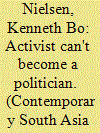

|
|
|
|
|
| Publication |
2012.
|
| Summary/Abstract |
This article explores the ambiguity inherent in the relationship between social activism and politics in West Bengal. I use a detailed account of the career of singer-activist turned politician Kabir Suman to examine the activist's view of himself and of politics, as well of how the porous boundary between activism and politics is both blurred and crossable. The fact that activists possess a kind of political capital useful within the framework of a political party may facilitate their entry into electoral politics. Yet as this article demonstrates, the activist may sometimes only be able to retain his activist credentials by sacrificing his political career. In addition, this article seeks to conceptualise the social activist as a particular type of political figure. I do so by locating the study of Kabir Suman within an emerging body of literature on political leadership in India. I argue that while the case of Kabir Suman may not be paradigmatic, his 'activist' style of leadership challenges certain contemporary classifications of political leadership in India.
|
|
|
|
|
|
|
|
|
|
|
|
|
|
|
|
| 2 |
ID:
193284
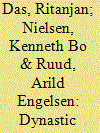

|
|
|
|
|
| Summary/Abstract |
This article contributes to the growing literature on political dynasticism in contemporary South Asia and shifts the focus from the much-debated national level dynasties to the usually ignored dynasties operating at subnational and regional levels. Analytically, it investigates the ‘moment’ of succession, conceptualised as the period when new heirs are actively enrolled in a dynastic formation. Such moments of succession can be perilous moments for dynastic formations, potentially disrupting its routine functioning style. And yet, these moments allow a clear identification and opportunity for analysis of the specific dilemma that all political dynasties have to negotiate. This dilemma can be described as follows: how to reconcile (1) the need to project emerging dynastic heirs as extraordinary beings embodying the special qualities of the original dynast, with (2) the equally pressing need to downplay inherited dynastic privilege – conceptualised here using Louis Dumont’s idea of ‘shamefacedness’ – often portrayed as an illegitimate source of power and influence in postcolonial South Asia. A successful succession, as this article argues, relies on the ability to negotiate this dilemma. To demonstrate this negotiation in practice, the article analyses two cases of dynastic succession: Abhishek Banerjee in West Bengal, India and Serniabat Sadiq Abdullah in Barishal, Bangladesh.
|
|
|
|
|
|
|
|
|
|
|
|
|
|
|
|
| 3 |
ID:
092214
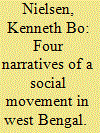

|
|
|
|
|
| Publication |
2009.
|
| Summary/Abstract |
Singur in West Bengal's Hooghly district became a household name across India when in May 2006 the state's Left Front government (LFG) announced that it would be the future location for the Tata small-car project. Here Tata Motors planned to produce the Tata Nano, the world's cheapest car, priced at only one lakh rupees. First, though, approximately 1,000 acres of agricultural land had to be acquired in Singur under the Land Acquisition Act of 1894.
|
|
|
|
|
|
|
|
|
|
|
|
|
|
|
|
| 4 |
ID:
192306
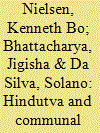

|
|
|
|
|
| Summary/Abstract |
In this viewpoint article, we analyse the heated controversy that unfolded in 2022 over who should be considered Goa’s patron saint: St. Francis Xavier or Bhagwan Parshuram. The controversy was sparked by a Hindu right organization named Hindu Raksha Maha Aghadi and its release of what it – with allusions to Vivek Agnihotri’s blockbuster ‘The Kashmir files’ – presented as ‘the Goa files’. These files ostensibly sought to bring to light the forced conversion of Goans to Catholicism under colonial rule, alongside other atrocities committed by Portuguese colonialists during their 450 years of rule in Goa. Taking our point of departure in an analysis of the contemporary symbolisms and political uses of Lord Parshuram both within and beyond Goa, coupled with an examination of the activities of Hindu nationalist groups in the state, we show how the campaign centred on Lord Parshuram and the ‘Goa Files’ were intended to produce communal polarization and further the Hindutva agenda in Goa. In this regard, political developments in India’s smallest state mirror broader national trends where the line between the mainstream Hindu nationalism of the BJP and the more radical ‘fringe groups’ is becoming increasingly blurred.
|
|
|
|
|
|
|
|
|
|
|
|
|
|
|
|
| 5 |
ID:
088366
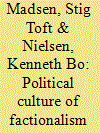

|
|
|
|
|
| Publication |
2009.
|
| Summary/Abstract |
The experience of international migration is generally found to turn migrants into culturally hybrid communities. Yet, migrant communities often hold on to their religious moorings even as they relocate. From the 1970s onwards, the emerging leadership of Hindu settlers in Denmark consciously tried to transfer with them what they saw to be key aspects of Hinduism as they migrated to Denmark. In 1985, Hindus organized a major conference to position the Vishwa Hindu Parishad (World Hindu Council) as the umbrella organization for Hinduism in Denmark. Later on they established a Temple of Indians called Bharatiya Mandir to provide a place of worship for local Hindus. The philosophy behind the temple conformed to the nondenominational Hindu nationalist vision of Hindus as a unified community. This article, which contrasts the aim of Hindu nationalism with the on-the-ground realities of Hindu mobilization in Denmark, reveals that two major factions spearheaded Hindu nationalist endeavors in Denmark from the 1980s until 2006. The two factions successfully launched several projects, and even collaborated in their execution, but the initiatives were beset with rivalries that hampered the communal unity they had set out to achieve. The authors analyze this factional rivalry as an expression of Indian political culture, arguing that tensions among Hindu activists in Denmark is an instance of the political factionalism prevalent in the Indian subcontinent. The unintended emergence of such factionalism represents the successful transfer of a core element of Indian political culture to a new locale through Hindu nationalist politics. The authors base their argument on field observations since the 1980s, recent interviews with key religious players, and more than two hundred pages of written materials that offer a rare entry point to the study of Hindu nationalism ex situ.
|
|
|
|
|
|
|
|
|
|
|
|
|
|
|
|
| 6 |
ID:
143544
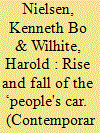

|
|
|
|
|
| Summary/Abstract |
When the Indian car manufacturer Tata Motors launched its new ‘people's car’ in 2008 it was widely predicted to revolutionise automobility in India. Yet seven years after the launch, the car has barely made an impact on the Indian car market and is widely regarded as a failure. This article offers a detailed study of the rise and fall of India's ‘people's car’. Based on a mapping of the changing popular representations and symbolic imaginaries that attach to the car as a means to mobility and an object of identity and social status, we suggest that the car failed neither because it was mediocre, nor because it remained economically out of reach for most Indians. Rather, we argue that its insertion into the lower ranks of a powerful status hierarchy of identity-defining objects precluded it from adequately tapping into new and hegemonic forms of consumer aspiration in ‘New India’.
|
|
|
|
|
|
|
|
|
|
|
|
|
|
|
|
| 7 |
ID:
157094
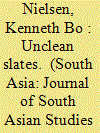

|
|
|
|
|
| Summary/Abstract |
This article interrogates the discourse of ‘greenfield development’ in contemporary India with special reference to the development of a greenfield airport in Goa. By unpacking the conflictual process between carrying out and challenging environmental impact assessments (EIAs) in connection with large-scale infrastructure projects, the article analyses the EIA process as one that simultaneously induces the articulation and territorialisation of the discourse of greenfield development in particular environments, with far-reaching consequences in terms of environmental change and land dispossession.
|
|
|
|
|
|
|
|
|
|
|
|
|
|
|
|
|
|
|
|
|